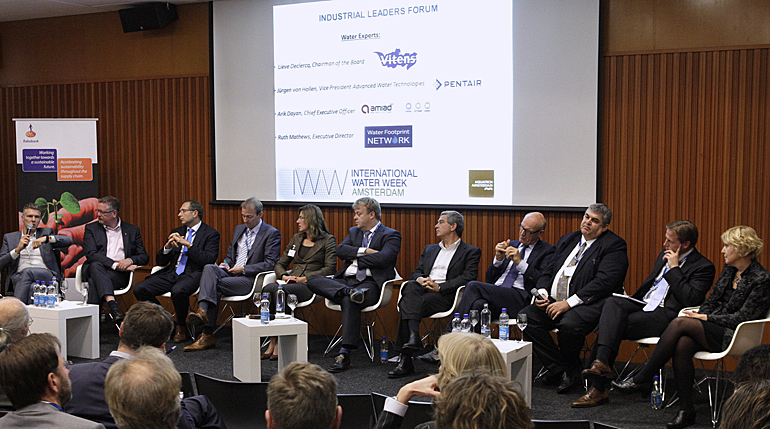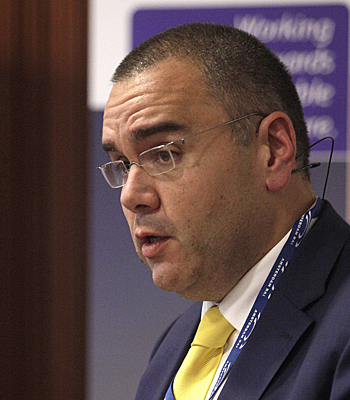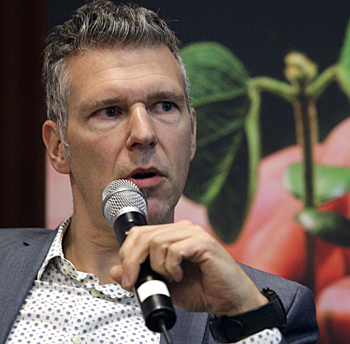IWW/Aquatech: Industry Leaders Forum acknowledges water scarcity as a risk to be handled locally
 How to make water scarcity accountable, that was the key question at the Industrial leaders Forum. Water related investments by world leading companies as CocaCola, Heineken en Akzo Nobel will only happen if there is clear view on the return-on-investment. This is goes both for water efficiency measures on their own production plants, as well as for measures outside their plant to protect the local fresh water resources. In the end the money goes to the project with the best revenue.
How to make water scarcity accountable, that was the key question at the Industrial leaders Forum. Water related investments by world leading companies as CocaCola, Heineken en Akzo Nobel will only happen if there is clear view on the return-on-investment. This is goes both for water efficiency measures on their own production plants, as well as for measures outside their plant to protect the local fresh water resources. In the end the money goes to the project with the best revenue.
A longer pay-back-time for projects to safeguard water resources from over-extraction, is not popular in board rooms. Industry regards water scarcity as a risk that has to be handled locally, together with the other water users of a watershed.
This revealed at the Industrial Leaders Forum that took place in Amsterdam on 6 November. The forum is one of the major events of the International Water Week Amsterdam.
Representatives from multinationals and the water technology sector shared their ideas on how to deal with the growing water scarcity in the world from an industry perspective.
 Forum chairman and initiator Menno Holterman, ceo of Nijhuis Water Technology, is convienced that the industry has to improve its water efficiency. It is their license to operate, he said at the kick off.
Forum chairman and initiator Menno Holterman, ceo of Nijhuis Water Technology, is convienced that the industry has to improve its water efficiency. It is their license to operate, he said at the kick off.
Investments in growth or sustainability
"In board rooms growth investments are popular because of the short term gain", said Daan Dijk, Managing director sustainable business development of Rabobank as the first speaker at the forum. "Investment in sustainability, in the long term protection of water resources is less attractive."
But Dijk notices that board members start to discuss the water issues. "It is like with an army. You may conquer new land but you also have to maintain your positions in the hinterland. Without investing in the long term protection of your water resources, there can be no growth. In the end there has to be balance between investments in growth and investments in sustainability", the banker in the forum assured. He assured that Rabobank has a hard nosed approach to its clients to maintain this balance when applying for credits.
Carbon is global, water is local
At the second Industrial Leaders Forum the water resource was a central theme. With a growing world population and more emerging economies, the demand for fresh water is expected to rise sharply. In water scarce areas the allocation of the available fresh water to communities, energy producers, agriculture and industry will become a bigger issue. CocaCola, Heineken and Akzo-Nobel showed to be aware of the fact that industry has to share its water resource with the local communities.
"Carbon is global, water is local", reacted Ron Bohlmeijer, work stream lead water stewardship for Heineken. "We have assessed our 170 breweries and found out that 23 of them, in Africa, Indonesia and Mexico, were at risk because of water scarcity. We are aware that we have to share the watershed with the local community. Therefore we like to participate locally in a joint water resource protection plan."
Different effects of water use
The industry uses vast amounts of water. At the forum CocaCola told it uses 160 million liter per year worldwide and AKZO-Nobel even 300 million liters. These figures concern the whole production chain, including the water use by their suppliers, as well - as in the case of AKZO-Nobel - by the product users. The figures must be seen in perspective, warned the forum speakers. "Our water use mainly concerns cooling water", explained Martijn Kruisweg of AKZO-Nobel. "We take the water from the river and return it only one degree warmer."
Focus on agricultural water use
Ron Bohlmeijer of Heineken went into details about the water use in the whole production chain of their beer. "Beer is 95% water", he said. "For the production of 1 liter beer, we use 4,5 liter water and in the end we return 3 liter cleaned process water back to the watershed." The biggest water use though is in the agriculture, Bohlmeijer explained. "Our breweries use barely malt and to produce this, farmers use 100 up to 250 liter of water per liter beer." Bohlmeijer emphasized this makes the water use in the agriculture of much great importance that the water use of the breweries. The forum agreed that the focus should not be on the figure itself. If the farmer use the rainwater surplus it is no problem. The real problem is when they deplete the ground water.
 Rudi Sueys of CocaCola explained why his company takes the lead on the development of water stewardship.
Rudi Sueys of CocaCola explained why his company takes the lead on the development of water stewardship.
Participation in local water projects
"The low hanging fruit have gone", said Rudi Sueys, Group Environment Manager of Water Stewardship & Sustainable Sourcing of CocaCola, "and water is so cheap that it is difficult to find finances for projects to further increase the water efficiency". Sueys distinguished the water projects inside the 900 bottle plants of CocaCola from the water projects to safeguard the watersheds where these plants depend on for their fresh water supply.
"Outside of our plants we have to deal with the local communities and we also have to consider our reputation". Therefore CocaCola does not consider the water resource issue as a matter on return-on-investment only, assured Sueys.
CocaCola did not wait for a fine-tuned methodology to calculate water scarcity and started to pay money to a water fund that financial supports all kinds of water project in water scarce parts of the world. The companies pays to the fund for all is unavoidable water use. The money in the fund is used for local water projects. Worldwide CocaCola is involved in over 500 water projects.
Dependency on local authorities
At the end of the forum the discussion concentrated on the aspect of leadership. Who brings all the stakeholders of a watershed together to discuss the allocation? It became clear that industry is in a difficult position to take the lead. The local authorities have to step in as well and take their role in the cooperation too. But as Rudi Sueys of CocaCola said: "Yes, we can do more."
(photos by NFP Photography/AmsterdamRAI)
Read more on IWW/Aquatech on this site
• Meet the Dutch water sector in Amsterdam!
• IWW/Aquatech: In-depth discussions and best practices at conference on future urban water management, 7 November 2013
• IWW/Aquatech: Sanergy wins 50.000 euro Sarphati award for establishing sanitation business in Nairobi, 6 November 2013
• IWW/Aquatech: Collective call for integrated water solutions at opening ceremony, 5 November 2013
• IWW/Aquatech: Pitch battle for entrepreneurs with highly innovative water technology solutions, 4 November 2013
• IWW/Aquatech Amsterdam 2013: Captains of industry to debate water use in the full product cycle, 22 October 2013
• Aquatech Amsterdam 2013 trade exhibition unveils nominees Innovation Awards, 9 October 2013
• New UNSGAB Chair Prince El Hassan Bin Talal keynote speaker at International Water Week, the Netherlands, 16 Augustus 2013
• International Water Week Amsterdam 2013 seeks inspiring water solutions for a green economy, 14 May 2013
More information
www.internationalwaterweek.com



